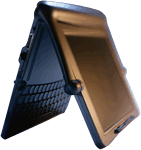
Jupiter
Microsoft have finally launched Jupiter the code name for what is now known as Windows CE Handheld PC Professional Edition. This is a relatively minor upgrade to Windows CE, still using the 2.x numbering series (it is 2.11), that supports larger display formats. The twist is that manufacturers are now allowed to use it in laptop sized formats. The first products to market are the Hewlett-Packard Jornada 820, LG Phenom Express, and the Vadim Clio. The most interesting of these, the Clio, isn't planned to be available in this country at first.
Jupiter is being positioned as a tool for mobile email, which I have said many times before that CE is particularly suited for, and to extend sales to corporate users with simple requirements who wouldn't normally be issued with laptops. Both the LG Phenom Express and the HP Jornada have a built in 56K modem, 10 to 15 hour projected battery life and VGA output to support this percieved market. The Jornada includes a USB support and a glide pad mouse, with 16 Mb of RAM, whereas the Phenom has 32 Mb. The HP Jornada 820 is available in the USA for $999, and the the UK from January for 800 GBP.
Vadem Clio

The interesting member of this trio is the Vadem Clio. Both the HP and the Phenom looks like classic, middle of the road (but small) laptops from the eighties. The Clio is the designer version, reminiscent in some ways of the fated and unlamented Pen Windows machines from a few years ago. It is close to A4 size (American Letter size, in fact), making it much larger than the other Pros. The screen is full sized, and can be rotated either into a normal face down to the keyboard orientation, like any other laptop, or into a face up orientation, so that it looks like a keyboardless note pad. Apart from this it doesn't have any special features, and even misses out on some of the details incorporated into HP's Jornada, with no VGA output or USB support.
CE HPC Pro includes a number of minor, but very desirable, upgrades. These include the usual flotilla of bug fixes to the Pocket Office applications, as well as a new application, Pocket Access. In this edition of CE (2.11), Microsoft have confirmed that Voice Recorder and InkWriter are officially parts of the CE package. Pocket IE will support Javascript and ActiveX, giving access through ODBC to database servers. Personally I don't much care for Javascript, largely because of the non-existent implied connection to Java in its name. However, in the past year Javascript has become a required feature in web browsers, such that many site have links that don't work and pages that don't display unless your browser of choice supports Javascript. As even Internet Explorer 3, the browser installed by default on all except the most recent OEM version of Windows 95, doesn't fully support Javascript, this seems to be a curious act of self-selection carried out by web site designers. Supporting Javascript in Pocket IE will be a popular move with roving webmasters at the very least.
The email client, Pocket Outlook, has had the biggest overhaul. It (at last) supports decoding attachments on the CE machine; previous CE mail clients could only decode attachements while connected to a desktop machine as part of their synchronisation process. So if you send a desktop Excel or Word file to a CE user, it should be correctly translated to the closest equivalent format in Pocket Excel or Pocket Word. It also supports IMAP, with hierarchical folders, and LDAP for email directory access. I haven't had my hands on one of these for any length of time yet, so I can't comment on how effective this upgrade is to the mail client. If it works well, it should be very good indeed, and will make an IMAP server a very useful asset indeed for any users. Despite the extra features of IMAP, most email clients than understand IMAP treat it as just a slightly different version of POP3, and ignore all of the extra features. Of course, if it doesn't make good use of IMAP, then it is yet another wasted opportunity for CE.
Hewlett-Packard have an ICA client available, which runs only on their machines (including the HP620 as well as the 820), which will allow CE users to run Windows NT applications remately from a Citrix MetaFrame server.
Words and design by:
Paul Lynch
Last updated: November 24, 1998